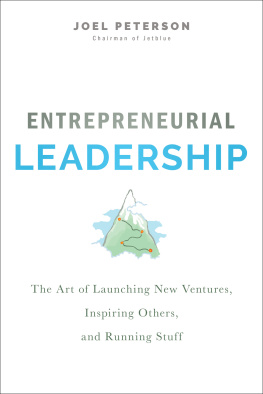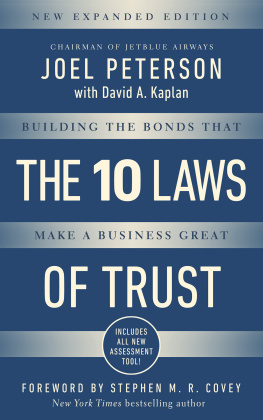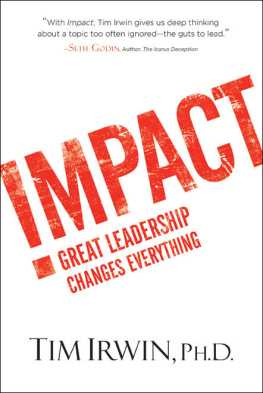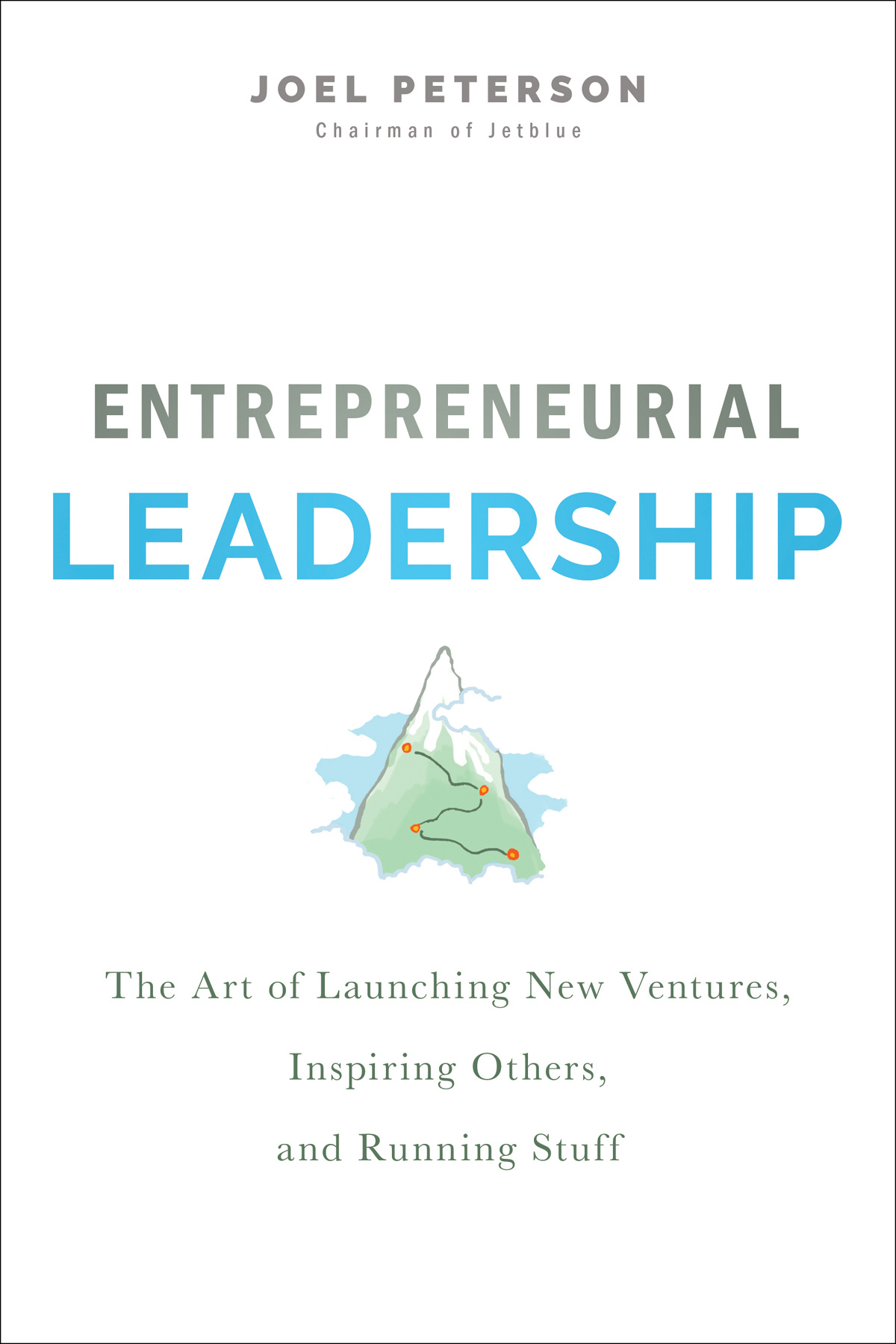2020 by Joel Peterson
All rights reserved. No portion of this book may be reproduced, stored in a retrieval system, or transmitted in any form or by any meanselectronic, mechanical, photocopy, recording, scanning, or otherexcept for brief quotations in critical reviews or articles, without the prior written permission of the publisher.
Published by HarperCollins Leadership, an imprint of HarperCollins Focus LLC.
Any internet addresses, phone numbers, or company or product information printed in this book are offered as a resource and are not intended in any way to be or to imply an endorsement by HarperCollins Leadership, nor does HarperCollins Leadership vouch for the existence, content, or services of these sites, phone numbers, companies, or products beyond the life of this book.
ISBN 978-1-4002-1677-2 (Ebook)
ISBN 978-1-4002-1675-8 (HC)
Epub Edition February 2020 9781400216772
Library of Congress Cataloging-in-Publication Data
Names: Peterson, Joel, 1947- author.
Title: Entrepreneurial leadership : the art of launching new ventures, inspiring others, and running stuff / Joel Peterson.
Description: Nashville: HarperCollins Leadership, 2020.
Summary: Make a lasting impact by launching new initiatives, inspiring others, and championing innovative approaches with this from-the-trenches guide by trusted executive mentor, entrepreneur, and leadership expert Joel Peterson-- Provided by publisher.
Identifiers: LCCN 2019040207 (print) | LCCN 2019040208 (ebook) | ISBN 9781400216758 (hardcover) | ISBN 9781400216772 (ebook).
Subjects: LCSH: Entrepreneurship. | Leadership.
Classification: LCC HB615 .P39468 2020 (print) | LCC HB615 (ebook) | DDC
658.4/092--dc23
LC record available at https://lccn.loc.gov/2019040207
LC ebook record available at https://lccn.loc.gov/2019040208
Printed in the United States of America
20 21 22 23 LSC 10 9 8 7 6 5 4 3 2 1
Information about External Hyperlinks in this ebook
Please note that the endnotes in this ebook may contain hyperlinks to external websites as part of bibliographic citations. These hyperlinks have not been activated by the publisher, who cannot verify the accuracy of these links beyond the date of publication
To My Students
CONTENTS
Guide
I first met Joel Peterson in 2010. Id recently ended my military service, and I had been asked to consider joining the board of JetBlue, where Joel is the chairman. Before the board extended an official invitation, I was asked to meet individually with a few directors, so we could assess whether Id be the right fit.
Upon sitting down with Joel, I was first struck by how humble and empathetic he was. In a one-on-one meeting, you get the sense hes thinking deeply about what he can do to help the person sitting across from him feel most comfortable and let his or her best qualities shine through. This may sound like a simple thing, but when you experience it in person, its quite remarkable.
From the moment I attended my first board meeting, Joel embraced and mentored me. He recognized that despite my military leadership experience, I had a lot to learn about how corporations work. Whats most striking about Joel in this setting is how quietly (but effectively) he guides a group of high-powered, sometimes voluble directors. He doesnt want or need anyone to recognize that hes in charge. He knows where he wants to go, but rarely does anyone recognize his hand on the tiller. The verb I often use to describe Joel is that he shapes things. When Joel is leading people, the group feels a unique sense of pride and accomplishment, because Joel deflects all credit away from himself and toward them. Joel epitomizes the selfless, self-effacing, servant leaderan operating style from which many of us can learn.
In Entrepreneurial Leadership, Joel lays out his vision for why the world needs more of these selfless, other-directed types. These are people who demonstrate the ability to do four things: build trust, set a mission, secure a team, and deliver results. Many people can do one or two of these things; remarkably few can do all of them. In this book, Joel offers practical guidance to help people on their journey to becoming an entrepreneurial leader.
This message resonates with me. During my years in the US Army, sometimes people asked me to comment on the general quality of our military commanders. Heres how Id break it down: A very small percentage were incompetent, and how they managed to stay in their jobs was always a bit of a mystery. The overwhelming majority were extremely capable. If given the right rules and procedures, some supervision, and a good team, they could move an organization forward. (I call these leaders mechanics; in Joels parlance, they are presiders.) But only a very small percentage could really change an organization, particularly in an atmosphere with as much bureaucracy as exists in the armed forces. These few are the entrepreneurial leaders Joel is describing.
As a West Point graduate, I have a deep admiration for the militarys ability to build leadersespecially the kind that excel at inspiring, engaging, and energizing subordinates. But I sometimes worry that the rules, formality, and bureaucracy of military life and training serve to file away whatever natural entrepreneurial edge our young officers may have. This is unfortunate, and its partly why change in the military happens so slowly. Like most organizations, the US military would be better off if it had more entrepreneurial leaders.
Joel epitomizes these qualities to such an extent that Ive sometimes made a statement my military friends think is hyperbolebut one I stand by. Heres the proposition: Ordinarily, officers spend at least twenty years being trained and reviewed for sequential promotions before attaining the rank of general, because the complexity of the job is thought to require a lifetime of on-the-job training. (This is why the army, unlike a corporation, doesnt use search firms or make external, mid-career hires.) But if Joel were somehow magically turned into a general and asked to lead infantry soldiers tomorrow, despite having no military experience, Im certain hed excel at the task. (Yes, wed have to teach him how to salute, how to understand the armys arcane acronyms, and some basics of military strategy and tactics, but that wouldnt take long.) Joel would succeed because he knows how to problem solve, how to execute, how to motivate, how to coach, how to connect with people of any rankand how to change organizations. Most importantly, soldiers would love being led by someone like Joel, just as Ive loved being led and mentored by him during my postmilitary excursion into the business world.
In short, Joel Peterson excels at entrepreneurial leadershipand this book can teach you to excel at it too.
General Stanley A. McChrystal,
US Army, Retired
Alexandria, Virginia
Not till we are lost, in other words, not till we have lost the world, do we begin to find ourselves.
Henry David Thoreau, Walden (1854)
J ust before sunrise, the search-and-rescue captain quietly pulled me aside outside the earshot of my son and two sons-in-law. Weve had nine volunteers on the mountain all night with lights, whistles, and bullhorns, he said. Weve covered all nine trails beginning to end. There was no sign of her. At 4:00 a.m. we sent up a helicopter with FLIR thermography (forward-looking infrared radiometry), so well soon know where she is.
By dawn, the captain had his answer from the helicopter pilot: No heat signature. Through a fog of fatigue and worry, I spotted my youngest son defying the rescue team and heading up the trail with a flashlight, hoping to succeed where the pros had failed. I knew I could not keep up with a determined, if ill-advised, thirty-two-year-old, so I stayed behind, asking the veteran search-and-rescue leader for his frank assessment.









